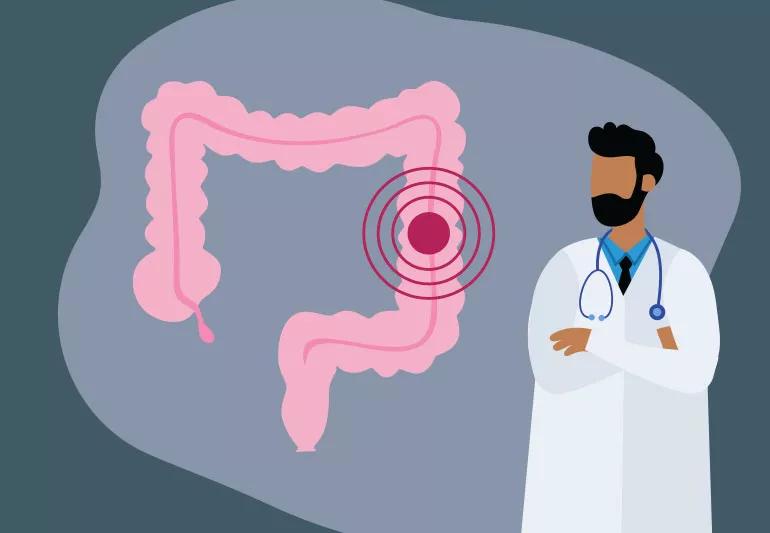Regular screenings starting at age 45 help lower your risk

Image content: This image is available to view online.
View image online (https://assets.clevelandclinic.org/transform/eea3ae5b-c0b9-42df-b6e4-670946e3d8f6/colonCancer1-1279896007-770x533-1_jpg)
colon cancer screenings
More than 130,000 people were diagnosed with colorectal cancer in 2020 — and that’s just in the United States. That’s a lot of people. What may surprise you even further is that colorectal cancer is actually preventable.
Advertisement
Cleveland Clinic is a non-profit academic medical center. Advertising on our site helps support our mission. We do not endorse non-Cleveland Clinic products or services. Policy
“You can’t prevent breast, lung or brain cancer in the same way,” says colorectal surgeon David Liska, MD. “You can’t take precancerous polyps off any of those organs like you can with the large intestine.”
And the good news is there’s more to colorectal cancer prevention than the dreaded pre-colonoscopy bowel prep. Dr. Liska shares six ways you can lower your colorectal cancer risk — and keep your colon and rectum working just as they should.
Colorectal cancer is a malignant tumor on the lining of the large intestine. It’s one of the leading causes of cancer-related deaths in the U.S. But it’s also highly treatable and curable when healthcare providers find it early.
“Colonoscopies save lives,” says Dr. Liska. Starting at age 45, everyone should get regular screenings with either a colonoscopy or one of the other recommended screening tests. That’s when colorectal cancer risk starts increasing.
When you’re high-risk: If colorectal cancer or advanced precancerous polyps run in your family, talk to a healthcare provider about starting screenings earlier than what’s generally recommended. Colonoscopy math works like this: Take the age of the youngest affected relative when they were diagnosed with advanced precancerous polyps or cancer. Subtract 10 years from that age. That’s when you should start having colonoscopies and continue them every five years. So, if your parent had advanced precancerous polyps at 50, you would begin colonoscopies at age 40.
Advertisement
Benefits of a colonoscopy: “Every colon and rectal cancer arises from a precancerous polyp or other precancerous lesion, and it takes 10 years on average for a benign polyp to become cancerous,” explains Dr. Liska. “A colonoscopy allows doctors to find and remove colon polyps before they’re a problem.”
Regular colonoscopies prevent the majority of colorectal cancers. And, in fact, the rate of colorectal cancer diagnosed in patients over the age of 50 is decreasing in this country. It’s encouraging to share that 65% of adults 50 to 75 are up to date on their screening. This decrease is largely due to screening and prevention by polypectomy. On the flip side, research shows that nearly all unscreened people know they should get a colonoscopy but still don’t.
“Sadly, every patient who walks into my office with colorectal cancer had a polyp that could have been removed,” Dr. Liska shares. “They missed the boat for some reason or another: They were too scared, their family doctor didn’t recommend it, their insurance company wouldn’t pay for it or they had a colonoscopy, and their doctor didn’t see the polyp.”
A better colonoscopy experience: Colonoscopies have undergone a mini-makeover in recent years, with researchers working hard to improve the patient experience:
Now that you’ve scheduled your colonoscopy appointment, what else can you do for colon health?
To your honey-do list, add eating more fruits, vegetables, whole-grain breads and cereals, nuts and beans. They’re linked to a lower risk of some cancers and can help you have healthy bowel function. Limit red meat and high-fat or processed meats, which can increase your colon cancer risk.
Advertisement
Check your body mass index (BMI) regularly. Your risk of colon cancer increases if you have a BMI > 25 (have overweight) or a BMI > 30 (have obesity).
Do at least 30 minutes of moderate-intensity exercise five days a week. This will help you maintain a healthy weight and stay stress-free, which can decrease cancer risk. Examples of moderate-intensity exercise for a healthy adult include a brisk walk, gardening or doubles tennis.
Keep an eye on your alcohol consumption, which is a general cancer risk factor. The recommended limits are one drink per day for women and two drinks per day for men.
On top of many other health risks, smoking increases your risk of colon cancer, so take steps to quit right away.
It’s not every day we learn that cancer can be prevented. By taking health-conscious steps, you can lessen your chances of developing colorectal cancer.
Advertisement

Delivered every Tuesday!
Sign up for our Health Essentials emails for expert guidance on nutrition, fitness, sleep, skin care and more
It's a letter about the news!
Learn more about our editorial process.
Advertisement
They might not be fun, but colonoscopies are low-risk, high-reward procedures
A steady increase in cases in those younger than 50 started decades ago
Know your risks for this highly preventable disease
Improved prep taste, timing make for a better experience
Chronic inflammation from flare-ups can damage the lining of your intestinal wall, making your colon more vulnerable to cancer
Colonoscopies and sigmoidoscopies are types of endoscopies, procedures that look at the health of your large intestine
If you’re at average risk, it’s recommended that you get your first colonoscopy at age 45
It’s a slow-moving process that offers an opportunity for early detection and treatment
Type 2 diabetes isn’t inevitable with these dietary changes
Applying a hot or cold compress can help with pain
Pump up your iron intake with foods like tuna, tofu and turkey